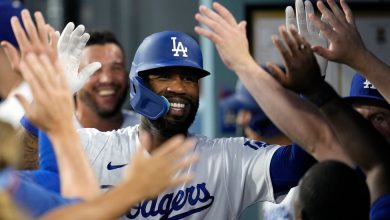A New Ethical Debate Looms for the Baseball Hall of Fame

It might have been the best game Jim Palmer ever pitched: 11 scoreless innings on a summer afternoon in Baltimore in 1977, with nine strikeouts and no walks. Palmer didn’t win it, though, because the Orioles never scored. Gaylord Perry, the slippery ace of the Texas Rangers, was dominant.
“I come out to get the ball and there’s two big fingerprints right on the slick spot of the ball, which is how you throw a spitter,” Palmer said. “So I go up to the umpire and I say, ‘I guess we don’t have to book him, his fingerprints are already on the ball.’ He just laughs, and they laughed all those years.”
“But Gaylord pitched all those innings, he was durable, he was marvelous. Are we going to keep him out of the Hall of Fame when he won 300 games?”
Perry made it on his third try, in 1991, with 77.2 percent of the vote from members of the Baseball Writers’ Association of America. Perry was a notorious cheater — he even wrote a book called “Me and the Spitter” — but he passed the test of “integrity, sportsmanship and character” that the Hall instructs voters to consider.
Those guidelines are not changing and will continue to complicate the voting process for years, even after Barry Bonds, Roger Clemens, Curt Schilling and Sammy Sosa fell off the writers’ ballots after Tuesday’s vote, their 10th appearance on the ballot without crossing the 75 percent threshold for election. Only David Ortiz (77.9 percent) made it this time.
Bonds, Clemens and Sosa were all strongly tied to performance-enhancing drugs. Ortiz had his own connection (a positive test in a 2003 survey, before he reached stardom), but just enough writers looked past it to elect him with 11 votes to spare. Alex Rodriguez — who had a better career than Ortiz but served a yearlong doping suspension in 2014 — missed election by 161 votes.
Yet Rodriguez, with 34.3 percent, had plenty of support to remain a viable candidate for the next ballot, which will include Carlos Beltrán, a newcomer with a different set of baggage. Beltrán had an exemplary career until the very end, when he participated in the Houston Astros’ sign-stealing scheme in 2017. Players had been granted immunity for cooperating with Commissioner Rob Manfred’s investigation, but Beltrán was retired by then and Manfred cited him by name.
Now the voters must judge whether Beltrán, a nine-time All-Star outfielder, meets the standards of the character clause for a plaque in Cooperstown, N.Y. The scandal already cost him his job as manager of the Mets, who swiftly fired Beltrán in January 2020, just 11 weeks after hiring him.
“I lost out for that job to Carlos Beltrán, and I had no issues with it at all,” said Eduardo Pérez, an analyst for ESPN and SiriusXM who played 13 seasons in the majors. “That’s the utmost respect I have for that man. Seeing it from my eyes, he’s a first-ballot Hall of Famer, like it or not — and don’t tell me that everyone in the Hall of Fame are perfect individuals. They’re far from perfect.”
Pérez, whose father, Tony, was inducted into the Hall of Fame in 2000, said today’s candidates face a different environment than those from previous generations. Several Hall of Famers committed ethical sins more troubling than spitballs — domestic violence, enforcement of the color barrier, collusion, alleged game-fixing, illegal recreational drug use — but now, it seems, a candidate’s transgressions seem more likely to stain or erase their legacies.
“In today’s world, because of social media and because of the access people have to information, you’re more vulnerable than you were back in the day,” Pérez said. “Character is seen differently, and it can be exposed easier.”
For all the focus on Bonds and Clemens, their vote totals actually rose from last year. Two other players had massive declines, and in both cases, writers clearly deployed the character clause.
Omar Vizquel dropped to 23.9 percent, from 49.1 percent, after his ex-wife accused him of domestic violence last December and a former bat boy filed a sexual harassment lawsuit last August. The decline of 25.2 percentage points is the biggest single-season drop since annual Hall of Fame voting began in 1966, according to research by Jayson Stark of The Athletic.
Schilling tumbled by 12.5 percentage points, from 71.1 to 58.6, after asking the Hall of Fame to remove his name from the ballot because he did not respect the writers. He has also amplified his rhetoric on social media, essentially undoing the goodwill he earned as a player when he won the Roberto Clemente Award, baseball’s highest honor for community service.
Beltrán also won that award, and voters should remember that when considering his candidacy. But the Hall of Fame will not tell voters what to make of Beltrán’s sign stealing with the Astros, just as they offered no instructions about how to account for steroid use.
“Once you try to start giving guidance on character in one instance, you probably have to start giving it in all instances,” Josh Rawitch, the president of the Hall of Fame, said in an interview on Wednesday. “We just think it’s far more important to leave that up to the electorate, whether that’s the B.B.W.A.A. or the era committees, because it means something different to every person.”
A 16-person committee will meet in December to evaluate the last 30 or so years, and Bonds, Clemens, Schilling and Sosa may get another look. But their presence on that ballot is not guaranteed; a panel of B.B.W.A.A. members devises the ballot, to be voted on by a committee approved by the board of the Hall of Fame.
“We try very hard to have a group of people that is part historians, part living Hall of Famers and part executives, all of whom are going to take an unbiased look at the candidates in the room,” Rawitch said. “We look for balance in terms of playing careers, where they grew up, race, gender — we’re trying to find a group of people that represents society. You might have somebody who has a strong opinion, and that’s OK, and they’re going to try to convince others to vote their way. But ultimately, we try to find a group of people who aren’t going to come in knowing who they plan on voting for.”
Palmer, who has served on a committee in the past, said the composition of that group will be essential in determining which candidates make it in. As always, character will be up for debate — but perhaps it should not be quite so essential.
“Even if I wasn’t in the Hall of Fame, the most memorable thing about that weekend is always the love affair that fans have with baseball and its records and its history,” Palmer said. “So what does character have to do with that? Is it that important, is it sacrosanct, that it overrides everything else?”
That question is up to each voter, and it is not going away.
“We believe that character matters in life, not just the voting process for the Hall of Fame,” Rawitch said. “Some industries are probably held to higher standards, baseball being one of those, and has always been one of those. We actually think that that’s a good thing.”





